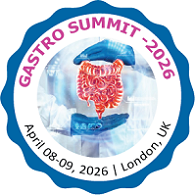About Conference
Welcome to the 14th World Gastro Summit
“Advancing Digestive Health: Innovation, Integration & Impact”
April 8–9, 2026 | London, United Kingdom
We are delighted to welcome you to the 14th World Gastro Summit, (Gastro Summit 2026) taking place on April 8–9, 2026, in the vibrant city of London, UK — the global hub for innovation, science, and collaboration.
This prestigious annual gathering unites leading gastroenterologists, hepatologists, endoscopists, oncologists, researchers, and industry professionals from around the world to share the latest breakthroughs in digestive health and gastrointestinal research.
Under the inspiring theme, “Advancing Digestive Health: Innovation, Integration & Impact,” The 2026 Summit aims to highlight transformative advances — from AI-driven diagnostics and microbiome therapeutics to next-generation endoscopy and integrated patient care.
Why Attend Gastro Summit 2026?
-
Global Networking: Connect with 1000+ experts, researchers, clinicians, and industry leaders from over 40 countries.
-
Scientific Excellence: Hear from renowned keynote speakers and experience high-quality plenary talks, panel discussions, and poster sessions.
-
Cutting-edge Research: Explore the latest innovations in gastroenterology, hepatology, microbiome science, and GI oncology.
-
Hands-on Workshops: Gain practical insights through live demonstrations and interactive endoscopy sessions.
-
Industry & Innovation Expo: Discover emerging technologies and partner with global brands driving the future of digestive health.
Conference Highlights
-
2 Days of Scientific Excellence — Thought-provoking plenary sessions, symposia & workshops
-
6 Major Scientific Tracks
-
Inflammatory Bowel Disease & Immunology
-
Hepatology & Liver Disorders
-
Advanced Endoscopy & Imaging
-
GI Oncology & Precision Medicine
-
Microbiome & Functional GI Disorders
-
Public Health, Screening & Tele-Gastroenterology
-
Young Researcher Forum & Best Abstract Awards
-
Networking Gala Dinner at London’s Iconic Venue
Who Should Attend?
-
Gastroenterologists, Hepatologists, Endoscopists, GI Surgeons
-
Researchers, Academicians, Clinicians
-
Pharmaceutical & Biotechnology Professionals
-
Medical Device and Diagnostic Companies
-
Healthcare Policy Experts, Nurses & Allied Health Practitioners
-
Students, Early-Career Scientists, and Industry Start-ups
About London, UK
Experience the historic and modern charm of London, one of the world’s most iconic cities — where culture, science, and global connectivity meet. From the River Thames and Westminster Abbey to world-class dining and attractions, London offers an unforgettable experience for every delegate.
Join Us in London!
Be part of the 14th World Gastro Summit where discovery meets dialogue and innovation transforms digestive care.
Dates: 8–9 April 2026
Venue: London, United Kingdom
Submit Your Abstract | Register Now | Sponsor & Exhibit Opportunities Available
Session/Tracks
Track: 1 Gastroenterologists
The Gastroenterologists brings together clinicians and researchers specializing in the diagnosis, prevention, and treatment of gastrointestinal disorders. This session highlights evolving clinical practices, novel diagnostic tools, and translational research that enhance patient care. Discussions will focus on evidence-based approaches to managing complex GI conditions, from functional disorders to malignancies. Case studies, interactive panels, and clinical updates will cover advancements in imaging, biomarkers, and patient-centered treatment pathways. Attendees will gain valuable insights into integrating technology, precision medicine, and data analytics into clinical practice. The track also emphasizes interdisciplinary collaboration among physicians, dietitians, and microbiome researchers to ensure holistic digestive health management.
Track: 2 Hepatologists
Dedicated to liver research and clinical excellence, the Hepatologists Track explores new frontiers in hepatology, including NAFLD/NASH, viral hepatitis, cirrhosis, and liver transplantation. Presentations will delve into molecular mechanisms of liver injury, regenerative therapies, and cutting-edge diagnostics such as elastography and non-invasive fibrosis assessment. With the increasing global burden of fatty liver disease, this session highlights population-based strategies, drug discovery, and nutritional interventions aimed at prevention and treatment. Global experts will discuss policy-level efforts and innovations improving liver disease outcomes. This track provides a comprehensive platform for exchanging insights across academic, clinical, and industrial perspectives on hepatology.
Track: 3 Endoscopists
This track is designed for endoscopists and interventional specialists focusing on advanced techniques, technologies, and safety practices in gastrointestinal endoscopy. Sessions will include discussions on next-generation endoscopy tools, image enhancement technologies, and AI-assisted diagnostics that are redefining early detection and treatment of GI diseases. Live demonstrations and case-based workshops will highlight therapeutic endoscopy, third-space procedures (such as POEM and ESD), and minimally invasive interventions. Experts will share practical approaches to training, quality assurance, and patient safety. Participants will leave with updated knowledge on how to incorporate innovations into their daily endoscopic practice to optimize outcomes.
Track: 4 GI Surgeons
The GI Surgeons Track focuses on surgical innovation in gastrointestinal and hepatobiliary care. Surgeons and researchers will present advances in minimally invasive and robotic-assisted surgeries, enhanced recovery protocols, and precision-guided operative planning. Topics include colorectal and bariatric surgery, hepatopancreatobiliary interventions, and complex case management. This track bridges the gap between surgical and medical gastroenterology, fostering teamwork for comprehensive GI care. Interactive sessions and videos will showcase technical excellence, complication management, and evolving surgical education. Participants will gain perspectives on integrating technology, simulation, and AI-based navigation to improve patient safety and surgical precision.
Track: 5 Precision Medicine
Precision Medicine is transforming the landscape of gastroenterology by tailoring treatment to individual genetic, molecular, and lifestyle profiles. This track explores how genomic data, molecular diagnostics, and computational modeling are enabling personalized therapeutic strategies for GI disorders and cancers. Topics include biomarker discovery, pharmacogenomics, patient stratification, and predictive analytics for disease prognosis. Presenters will demonstrate how big data and AI tools accelerate early detection and targeted therapies. This session emphasizes translating laboratory discoveries into clinical applications, driving a new era of personalized gastroenterology that maximizes efficacy while minimizing adverse effects.
Track: 6 Microbiome
The Microbiome Track examines the gut microbiota’s profound influence on digestive and systemic health. Experts will discuss cutting-edge findings on microbial diversity, dysbiosis, and the microbiome’s role in inflammatory, metabolic, and neurological diseases. The session will cover probiotics, fecal microbiota transplantation, and next-generation microbiome therapeutics. Researchers will present integrative studies linking diet, lifestyle, and microbial composition to gastrointestinal outcomes. Attendees will learn about emerging diagnostics, systems biology approaches, and personalized nutrition guided by microbial signatures. This track offers an interdisciplinary view of how microbiome science can transform preventive and therapeutic gastroenterology.
Track: 7 Gastroenterology
This flagship track captures the entire spectrum of gastroenterology, uniting clinical practice, research, and innovation. Sessions will highlight progress in diagnosing and treating GI diseases, from reflux and peptic ulcer disease to IBD, IBS, and GI malignancies. The focus will be on evidence-based guidelines, new pharmacologic agents, and multidisciplinary models improving patient outcomes. Experts will discuss how precision medicine, digital health, and tele-gastroenterology are modernizing care delivery. The track also encourages collaboration between clinicians, researchers, and public health professionals to strengthen global digestive health strategies.
Track: 8. Public Health
The Public Health Track explores strategies to reduce the global burden of gastrointestinal and liver diseases through prevention, screening, and policy innovation. Speakers will discuss the implementation of national screening programs for colorectal cancer and hepatitis, as well as initiatives for early diagnosis and lifestyle interventions. The session emphasizes health equity, access to GI care, and cost-effective approaches in low- and middle-income countries. It also covers the role of telemedicine, community education, and digital outreach in improving GI health awareness. Attendees will gain a broader understanding of how public health systems can integrate digestive health into universal healthcare frameworks.
Track: 9. Liver Disorders
This session focuses on the complex and evolving landscape of liver diseases, including hepatitis, fatty liver disease, autoimmune hepatitis, cirrhosis, and hepatocellular carcinoma. Experts will share updates on diagnostic algorithms, therapeutic trials, and surgical interventions. The program also explores liver regeneration, stem cell applications, and liver transplant innovations. With lifestyle-related liver diseases on the rise globally, this track provides insights into preventive approaches, risk factor management, and novel pharmacotherapies. Participants will engage in case-based discussions and learn from pioneering hepatology research shaping the future of liver medicine.
Track: 10. Endoscopy
The Endoscopy Track offers a comprehensive review of diagnostic and therapeutic endoscopy advancements. The focus is on innovations in imaging, AI-assisted lesion detection, capsule endoscopy, and robotic systems improving precision and safety. Sessions include updates on gastrointestinal bleeding control, stenting, ESD/EMR techniques, and quality benchmarks. This track also emphasizes training, accreditation, and patient safety protocols. By bringing together experienced practitioners and technology innovators, it provides a complete view of how modern endoscopy continues to revolutionize digestive disease management.
Track: 11. Inflammatory Bowel Disease (IBD)
The IBD Track is dedicated to the evolving science and management of Crohn’s disease and ulcerative colitis. Sessions will explore immunopathogenesis, biomarkers for disease activity, biologic and small-molecule therapies, and strategies for personalized treatment. Experts will discuss new guidelines, emerging clinical trials, and real-world outcomes. Attention will be given to the role of diet, microbiome, and mental health in disease modulation. Attendees will also learn about digital health monitoring and multidisciplinary care approaches that improve quality of life for IBD patients worldwide.
Track: 12 Gastrointestinal
This comprehensive track covers functional and structural gastrointestinal disorders affecting the esophagus, stomach, intestines, and pancreas. Presentations will focus on motility disorders, acid reflux, IBS, and gastrointestinal bleeding management. Cutting-edge diagnostic tools such as motility testing, pH monitoring, and advanced imaging will be reviewed. Experts will highlight pharmacologic, surgical, and behavioral interventions that enhance symptom control and patient satisfaction. The session underscores the importance of integrated care and lifestyle modification in achieving optimal GI function and long-term well-being.
Track: 13 Oncologists
The Oncologists Track focuses on the prevention, detection, and treatment of gastrointestinal cancers. It showcases advances in early diagnosis, molecular profiling, immunotherapy, and targeted therapy for colorectal, gastric, pancreatic, and hepatobiliary cancers. Multidisciplinary tumor boards and case reviews will demonstrate collaborative approaches between oncologists, surgeons, and gastroenterologists. The track also addresses survivorship, palliative care, and the integration of precision medicine into oncology practice. Participants will discover new research translating genetic insights into improved patient survival and treatment outcomes.
Track: 14 Digestive Health’s, Therapeutics & Diagnostics
This unifying track emphasizes the latest innovations driving the future of digestive medicine. Topics include novel pharmacotherapies, regenerative treatments, AI-driven diagnostics, and non-invasive imaging solutions. Experts will discuss cross-disciplinary strategies to enhance early disease detection, improve therapeutic efficacy, and promote gut health. The track also explores nutrition, lifestyle medicine, and the gut-brain axis as key components of preventive gastroenterology. Through research presentations, product showcases, and expert dialogues, attendees will gain a comprehensive understanding of the next generation of digestive health solutions.
Market Analysis
The global gastroenterology and digestive health market is experiencing rapid expansion, driven by rising disease prevalence, lifestyle changes, and technological innovations in diagnostics and therapeutics. According to recent industry reports, the global gastroenterology market was valued at USD 48.3 billion in 2024 and is projected to reach approximately USD 67 billion by 2030, growing at a compound annual growth rate (CAGR) of 6.2%. Within this, the endoscopy devices segment alone accounts for over USD 15 billion, supported by the adoption of minimally invasive and AI-assisted technologies. The hepatology segment—driven by increasing cases of NAFLD and NASH—represents nearly 25% of the total market share and is expected to surpass USD 17 billion by 2028.
The burden of gastrointestinal diseases continues to rise globally, affecting an estimated 1 billion people, with inflammatory bowel diseases (IBD) such as Crohn’s and ulcerative colitis impacting 10 million individuals worldwide. Europe and North America together account for nearly 60% of the global gastroenterology device and therapy market, with the United Kingdom representing around 8–10% of that share due to its advanced healthcare infrastructure and academic-industry collaborations.
In parallel, the global microbiome therapeutics market—a major focus area for this summit—is projected to grow from USD 380 million in 2024 to USD 1.8 billion by 2031 at an impressive CAGR of 25%. The strong integration of AI in diagnostics and digital gastroenterology platforms is expected to further add USD 5–7 billion to the global value chain by 2030.
Given London’s global accessibility, strong biomedical ecosystem, and the surge of innovation in digestive health, the 14th World Gastro Summit 2026 offers an unparalleled platform for scientific exchange, industry partnerships, and market exposure—connecting more than 1,200 participants with leading brands, innovators, and research institutions shaping the future of gastrointestinal medicine.















